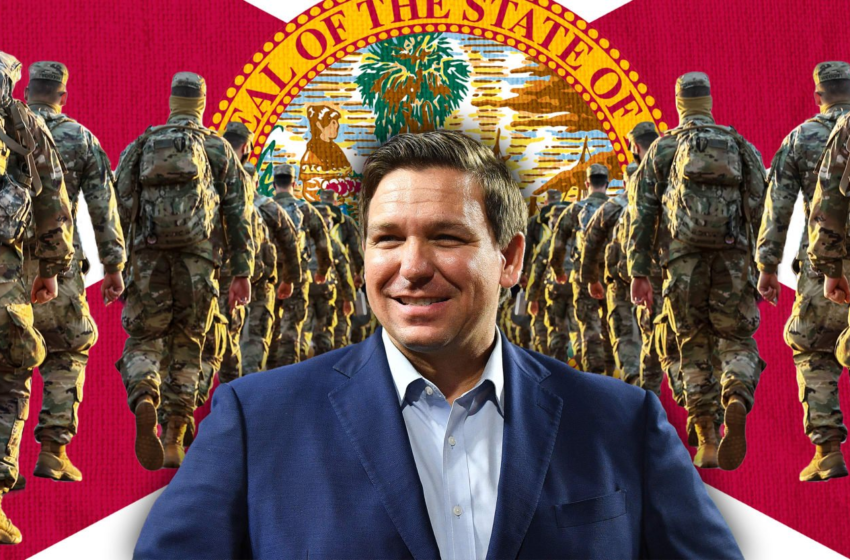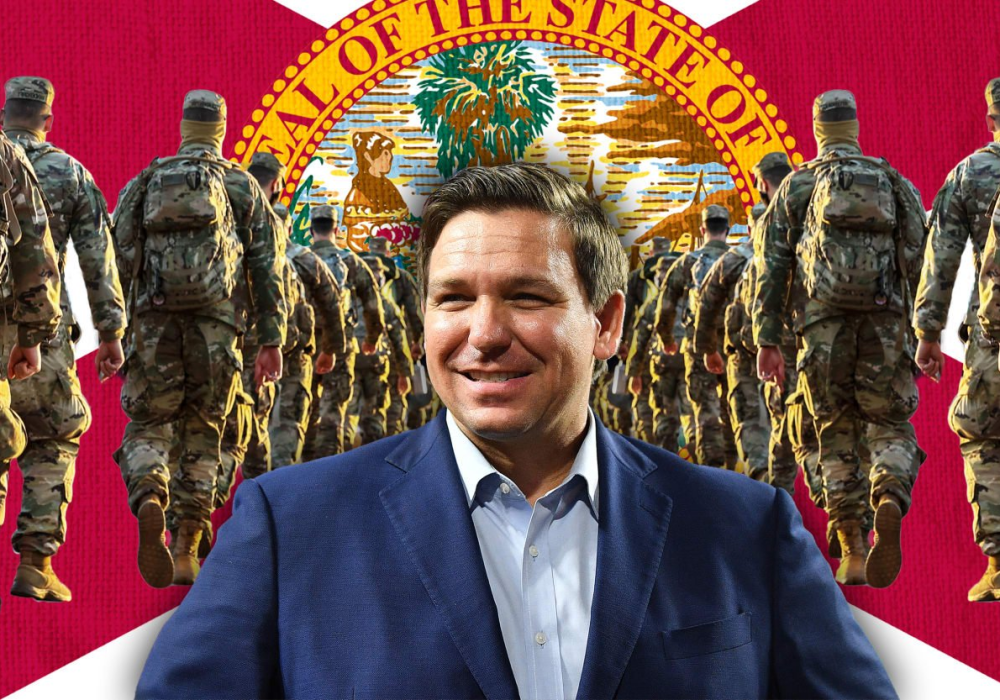As governor of Florida, Ron DeSantis is understandably big on gators.
He had a gator logo along with the words “Don’t Tread on Florida” stenciled onto a sign he unveiled in October when calling for a special session of the legislature to counter federal COVID-19 vaccine mandates.
And his office had that gator’s twin on another sign with the words “Let Us Alone” affixed to the podium at a national guard armory in Pensacola on Thursday. The staging was completed with a huge American flag and a dozen national guardsmen who stood at attention as DeSantis entered.
“At ease,” he quietly told them.
The soldiers immediately obeyed, for they are under his command unless nationalized by presidential order. He was there to announce increased funding for the Florida National Guard.
But he also made known a plan to revive a state military unit whose uniforms will say FLORIDA rather than U.S. ARMY like those worn by the soldiers who stood at ease behind him as he now took to the podium. No matter what the president might want, the Florida State Guard will answer only to the governor—meaning DeSantis.
Call it Ron’s army.
“The Florida State Guard will act as a civilian volunteer force that will have the ability to assist the national guard in state-specific emergencies,” DeSantis said.
It will number only 200, so it is hard to see what actual difference it could make beyond the 12,000 guard members.
But that is not the real mission of Ron’s Army.
Back at the start of World War II, the federal government authorized the states to form military units to fill in for the national guard, which had been incorporated into the U.S military to fight in Europe and the Pacific. The Florida Guard was formed in 1941. Its motto, “Let Us Alone,” invoked fealty to Florida, not to America, even though this was a time that called for national unity against a common enemy.
Those same three words had appeared on a flag that Florida’ first governor, William Moseley, flew at his inauguration in 1841. But, perhaps because Florida’s leading business people were actively engaged in trade with folks from beyond its borders, the state senate took exception to the words and never officially approved the flag.
The words reappeared on April 8, 1861, when members of the Florida militia took control of Fort Clinch in Fernandina Beach. That was four days before the Battle of Fort Sumter in South Carolina marked the start of the Civil War.
“Hurrah for Florida, Let Us Alone,” this banner read.
Armed conflict might have broken out three months earlier when another banner—a modified American flag with only one big star modeled after the standard of the Texas navy—was hoisted by a Florida militia led by a plantation owner over a fort in Pensacola. Hostilities were temporarily averted when the militia agreed not to attack if the federal actors promised not to reinforce.
Florida then had a population of 140,000, just under half of whom were slaves. Some 14,000 Floridians fought for the Confederacy in the ensuing war. And 5,000 died.
The conflict was resolved only by force, and a state-before-nation resentment of federal control endured through the generations among some whites in Florida. It was evident in the state guard’s motto even though their unit was formed to stand in for those off fighting for the nation.
But following the return of the Florida National Guard, the state guard was disbanded in 1947. Most states did the same, but two dozen state guards were revived in the early 1980s during the Reagan administration. The Utah state guard was purged in 1987, after journalist Jack Anderson reported that it was said to be “peppered with neo-Nazis, felons and mental patients.” The Virginia state guard was investigated amid rumors that some of its members were seeking to raise enough money to purchase a tank. And the New York Guard was said to have secured funding for its operations by awarding generalships to influential politicians, some of whom had never been in the military.
Even so, the New York Guard was one of 12 state boards that responded during the COVID-19 pandemic to assist the fight against the virus. DeSantis has not indicated that Ron’s army will be similarly stepping up if his state suffers another deadly surge.
Actually, DeSantis himself is not doing much of anything to fight the virus besides boasting that Florida presently has the lowest infection rate in the nation. Never mind that as of Thursday it had racked up the third-highest number of infections, 3,730,395. It also had the third-highest number of deaths, 52,647.
DeSantis has responded to that body count—more than four times Florida’s losses during the Civil War—by hiring Dr. Joseph Lapado as his surgeon general. Lapado has perpetuated falsehoods about masks and about the vaccines. The truth is that the jab and face coverings save lives. And to dissuade people from seeking those protections places them in needless danger.
So, DeSantis clearly did not decide to revive the state guard in response to a new variant that complicates a continuing national emergency that has left 786,000 Americans dead and hundreds of thousands more disabled. He told the crowd at the armory on Thursday that Biden should also essentially do nothing, not even something so simple as restricting air travel.
“I think all it’s going to do is cause a lot of problems,” DeSantis said at the armory. “I don’t think that they should be imposing any mandates on air travel or any of the things that they have done. I think it has not been anything that’s really made much of a difference. I think it’s inconvenienced a lot of people. I think it’s crimped the willingness of people to travel.”
All that raises the question of what DeSantis intends to do with something so small as Ron’s Army.
Not for nothing were “Let Us Alone” and the gator affixed to that podium. Not for nothing were the gator’s twin and “Don’t Tread on Florida” on those signs.
The real mission of Ron’s Army is to appeal to that state-before-nation sentiment, along with the individual-before-feds feelings that fill the MAGA base. Ron’s Army sure looks like part of a long-term DeSantis plan to become the commander-in-chief of the whole country.
At that prospect, nobody should be at ease.







